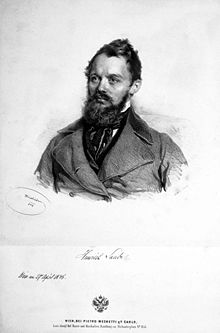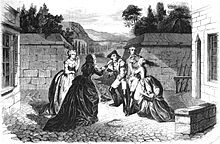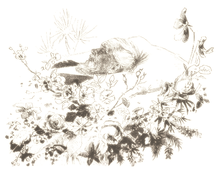Heinrich Laube

Heinrich Rudolf Constanz Laube (born September 18, 1806 in Sprottau , † August 1, 1884 in Vienna ) was a German writer , playwright and theater director and a member of the Frankfurt National Assembly .
Life
Heinrich Laube was the son of a glove maker. He grew up in humble circumstances and in 1820, when he was 14 years old, he entered the grammar school in Glogau (now Głogów ). During his school days he got a free table , but had to pay for it with tutoring. In 1825 he switched to the somewhat more liberal grammar school in Schweidnitz (today Świdnica ).
The school he finished with twenty years and enrolled in 1826 at the University of Halle for the subject of theology . In the first three semesters Laube was extremely active in the old Halle fraternity (joined in 1826), which ultimately brought him almost two months of detention . For the fourth semester, Laube moved to Breslau , but without concentrating more on his studies. In Breslau he became a member of the old Breslau fraternity Arminia in 1828 .
Here in Breslau he found access to a group of young writers and made his debut in early 1829 with theater reviews in the Breslau magazine Die Freikugeln . In that year he also changed his subject and is now taking literary history . In July of the same year he took over the editing of the newly founded newspaper Aurora , which, however, ceases to appear in the course of the same year. Karl Schall then brought him to the Breslauer Zeitung as a theater critic .
Since Laube was undecided about the choice of profession, he took a position as tutor in the family of Dr. Rupricht in Kottwitz near Breslau. During this time he sympathized with the ideas of the French July Revolution and with the Polish uprising . Laube had been working at Gut Jäschkowitz since mid-1831, also as a private tutor.
In June 1832 Laube went to Leipzig , and at the end of the same year he was appointed editor of the newspaper for the elegant world . In this magazine he more and more often articulated his political opinion, u. a. also his enthusiasm for the young Germans . In the summer of 1833 he went on a trip to Italy with the young German writer Karl Gutzkow , which was later discussed in the travel sketches . Since Laube was expressing himself more and more politically in his essays at this time, the Saxon government decided to expel Laube from Dresden in the spring of 1834 . Laube became friends with Ludolf Wienbarg , who was next to Gutzkow as the spokesman for Young Germany . On July 26th, he was arrested in Berlin . In September 1834 there was an indictment of fraternities and inciting dissatisfaction against the German Confederation . He was only released from custody at the end of April 1835. Laube Naumburg was assigned as the whereabouts and constant police surveillance was ordered. Richard Wagner was deeply affected by Laube's fate during this time.
In 1836 Laube married Iduna Hänel (née Buddeus, 1808–1880), the widow of the Leipzig medical professor Albert Friedrich Hänel (1800–1833). She brought a son, Albert Hänel , with her into the marriage. The son Hans Laube (1837–1863) emerged from her connection with Heinrich Laube. The couple went on their honeymoon to Strasbourg , where Laube spied for the Prussian Minister of the Interior Gustav Adolf von Rochow . Prussia was very interested in the Strasbourg putsch by Louis Napoleon . At the end of 1835, Laube incognito took over the editing of the midnight newspaper, in which he published numerous articles anonymously during 1836.
In the winter of 1836/37 the Berlin Superior Court finally passed the verdict in the trial against Laube: seven years imprisonment . After a petition for clemency and vehement advocacy of his supporters, the sentence was shortened to 18 months. As a place of penal Laube was at the instigation of the liberal writer and nobleman Prince Hermann von Pückler-Muskau , the Schloss Muskau ( Oberlausitz assigned), where he was able to move freely and with that in Muskau living composer and writer Leopold Schefer had many conversations and like went hunting.
In the early summer of 1839, after his release from prison, Laube traveled to Paris with his wife . There he got to know almost all the greats in French art and literature. After his return in 1840, Laube lived in Leipzig and began writing for the stage. During these years a number of pieces were created that did not cause minor scandals: “Rococo” was decried as immoral , “Struensee” was thought to be a plagiarism of the tragedy of the same name by Michael Beer , and “Prinz Homburg” caused a political stir.

From 1845 he made contacts with various Viennese theaters. During the March Revolution of 1848, Laube was seen again taking part in political events: in Frankfurt he was the reporter for the pre-parliament . As a member of his home district he was unsuccessful, but was able to move into the Paulskirche in Frankfurt with a German-Bohemian mandate . There he was counted as a monarchist at the Augsburg court . After the election of the emperor in March 1849, he resigned his mandate because he saw his idea of a Greater German State as a failure.
At the end of the same year, Laube was appointed artistic director of the Vienna Burgtheater . He held this office for over eighteen years until he resigned in the fall of 1867 in a dispute with the artistic director Friedrich Halm . Laube retired into private life until 1869; This year he took over the provisional management of the city theater in Leipzig for almost two years . In 1872 he was offered the management of the new Vienna City Theater . He accepted and held this position, with a break in 1875, until 1880. He was one of the founding members of the German School Association .
Heinrich Laube died in Vienna on August 1, 1884. Grave site of the evangelical cemetery Vienna Matzleinsdorf (group 18, crypt 186). In 1891 the Laubeplatz in Vienna- Favoriten was named after him.
The actress Cornelia Haas (1830–1916) was the illegitimate daughter of Heinrich Laube.
monument
Just one year after his death, a memorial was unveiled in Sprottau on September 18, 1885, modeled by the sculptor Johannes Pfuhl . The whereabouts are unknown.
Portrait medal
- 1876 bronze, 50 mm, on his 70th birthday. Medalist: Josef Tautenhayn sen. Literature: Wurzbach 4876. Friedensburg & Seger 3850.
Works (selection)
-
The new century . Vol. 1-2.
- Vol. 1: Poland . Fürth: Korn 1833
- Vol. 2: Political Letters . Leipzig: Literary Museum 1833
-
Young Europe. Novella. Dept. 1–3. 5 vols. Leipzig: Wigand 1833; Mannheim: Hoff: 1837. ( digitized version and full text in the German text archive ) Vol. 1.2 ( digitized version and full text in the German text archive )
- 1 .: The poets. 2 vol., 1833
- 2 .: The warriors. 2 vol., 1837
- 3rd: The citizens. 1 vol., 1837
- Travel novels . Vol. 1. 2. Leipzig: Wigand 1834. Vol. 3.4. Mannheim: Hoff 1836. Vol. 5. 6 (= Neue Reisenovellen , Vol. 1.2). Mannheim: Hoff 1837; Facsimile printing: Frankfurt a. M .: Athenaeum 1973 (Athenaeum reprints: The young Germany).
- Heinrich Laube. Journey through the Biedermeier period . Edited by Franz Heinrich Körber. Hamburg 1965
- Modern characteristics . 2 vols. Mannheim: C. Löwenthal 1835.
- Countess Chateaubriant (1843)
- George Sand 's pictures of women. With 24 steel engravings . Brussels: Belgian Book Trade Association 1845.
- Monaldeschi . Tragedy. Leipzig 1845.
- The Amber Witch (1847) ( digitized and full text in the German text archive )
- Struensee (1847)
- The Karl students. Play in 5 acts . Leipzig: Weber 1847. Digitized
- The first German parliament . 3 vols. Leipzig: Weidmann 1849
- Earl Essex (1856)
- The German war. Historical novel in three books . 9 vols. Leipzig: Haessel 1863–1866
- The North German Theater. A new contribution to German theater history . Leipzig: JJ Weber 1872.
- Collected Writings . 16 vols. Vienna: Braumüller 1875–1882
- Memories . 2 Vols. Vienna: Braumüller 1875–1882 (= Collected Works, Vols. 1 and 16)
- The shadow Wilhelm. A historical narrative . Leipzig: Haessel 1883.
- Franz Grillparzer's life story. With the portrait of the poet in steel engraving . Stuttgart: Cotta 1884.
- Ruben. A modern novel . Leipzig: Haessel 1885.
- Collected works in fifty volumes . With the participation of Albert Hänel ed. by Heinrich Hubert Houben . Leipzig: Hesse 1908–1909
-
Dramaturgical writings . Edited by Heinrich Hubert Houben. Leipzig: Hesse 1908–1909. (Separately from the Collected Works .)
- Vol. 1–2: Letters on the German Theater. The Burgtheater .
- Vol. 3: The North German Theater .
- Vol. 4: The Vienna City Theater .
- Writings on theater . Edited by the German Academy of the Arts in Berlin. Selected and introduced by Eva Stahl-Wisten. Berlin: Henschel Verlag 1959.
literature
- Adolf Wiesner: Mr. Heinrich Laube against Friedrich Hecker , Robert Blum , Adolph von Trütschler , the Vienna Student Legion . 1850.
- Heinrich Hubert Houben : Heinrich Laube's life and work . Reprint from: Heinrich Laubes selected works in ten volumes. Leipzig: Hesse 1905.
- Karl Nolle: Heinrich Laube as a social and political writer . Bocholt: Temming 1914; at the same time diss. Münster 1915.
- Elfriede Wehler: The epic portrayal in H. Laube's novel trilogy “The German War” . Dissertation Hamburg 1928.
- Erich Ziemann: Heinrich Laube as a theater critic . Bonn 1931 (dissertation Cologne 1931; partial print); that. Emsdetten: Lechte 1934.
- Lothar Sträter: Burgtheater director Heinrich Laube and his audience . Diss. Vienna 1960.
- Walter Hömberg : Zeitgeist and idea smuggling. The communication strategy of Junge Deutschland . Stuttgart: Metzler, 1975. Dissertation Salzburg 1973.
- Georg Altmann: Heinrich Laube's principle of theater management . Hildesheim: Gerstenberg 1978. ISBN 3-8067-0708-1 .
- Julia K. Lawson: Heinrich Laubes "Young Europe" . Diss. Bloomington, Ind. 1980.
- Ellen von Itter: Heinrich Laube: a young German journalist and critic . Frankfurt a. M .: Lang 1989 (Europ. Hochschulschriften, Series 1, H. 1143) ISBN 3-631-40708-4
- Jakob Karg: Poetry and Prose. Studies on the literary understanding of the young German Heinrich Laube . Bielefeld: Aisthesis-Verl., 1993. ISBN 978-3-925670-95-4
- Leszek Dziemianko, Marek Hałub, Matthias Weber (eds.): Heinrich Laube (1806–1884). Life and work. Inventories - facets - connections. Leipzig: Leipziger Universitätsverlag, 2016. (Schlesische Grenzgänger. Vol. 8.) ISBN 978-3-86583-910-7
Lexicon article
- Constantin von Wurzbach : Laube, Heinrich . In: Biographisches Lexikon des Kaiserthums Oesterreich . 14th part. Kaiserlich-Königliche Hof- und Staatsdruckerei, Vienna 1865, pp. 193–211 ( digitized version ).
- Heinrich Hubert Houben : Laube, Heinrich . In: Allgemeine Deutsche Biographie (ADB). Volume 51, Duncker & Humblot, Leipzig 1906, pp. 752-790.
- Hanus: Arbor Heinrich. In: Austrian Biographical Lexicon 1815–1950 (ÖBL). Volume 5, Publishing House of the Austrian Academy of Sciences, Vienna 1972, p. 45 f. (Direct links on p. 45 , p. 46 ).
- Johannes Weber: Laube, Heinrich. In: New German Biography (NDB). Volume 13, Duncker & Humblot, Berlin 1982, ISBN 3-428-00194-X , pp. 689-692 ( digitized version ).
- Helge Dvorak: Biographical Lexicon of the German Burschenschaft. Volume I: Politicians. Volume 3: I-L. Winter, Heidelberg 1999, ISBN 3-8253-0865-0 , pp. 247-250 and Volume II: Artists. Winter, Heidelberg 2018, ISBN 978-3-8253-6813-5 , pp. 442-444.
- Christian Fastl: Laube, Heinrich. In: Oesterreichisches Musiklexikon . Online edition, Vienna 2002 ff., ISBN 3-7001-3077-5 ; Print edition: Volume 3, Verlag der Österreichischen Akademie der Wissenschaften, Vienna 2004, ISBN 3-7001-3045-7 .
Web links
- Literature by and about Heinrich Laube in the catalog of the German National Library
- Works by and about Heinrich Laube in the German Digital Library
- Works by Heinrich Laube in the Gutenberg-DE project
- Works by Heinrich Laube at Zeno.org .
- Entry on Heinrich Laube in the Austria Forum (in the AEIOU Austria Lexicon )
- Laube's manuscripts and letters in libraries and archives
- Holdings in the catalogs of the Austrian National Library Vienna
- Heinrich Laube in the Internet Archive
Individual evidence
- ^ Johannes Lochner: Berlin contributions to Germanic and Romance philology: Germanic department . tape 29 . E. Ebering, 1910, p. 15 ( limited preview in Google Book search).
- ↑ Martin Geck : Richard Wagner , biography. Siedler, Munich 2012, ISBN 978-3-88680-927-1 , p. 40
| personal data | |
|---|---|
| SURNAME | Arbor, Heinrich |
| ALTERNATIVE NAMES | Laube, Heinrich Rudolf Constanz |
| BRIEF DESCRIPTION | German writer, playwright and theater director |
| DATE OF BIRTH | September 18, 1806 |
| PLACE OF BIRTH | Szprotawa |
| DATE OF DEATH | August 1, 1884 |
| Place of death | Vienna |

